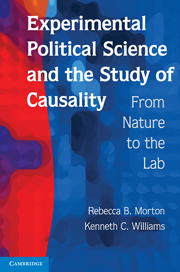Book contents
- Frontmatter
- Contents
- Acknowledgments
- I INTRODUCTION
- II EXPERIMENTAL REASONING ABOUT CAUSALITY
- III WHAT MAKES A GOOD EXPERIMENT?
- IV ETHICS
- 11 History of Codes of Ethics and Human Subjects Research
- 12 Ethical Decision Making and Political Science Experiments
- 13 Deception in Experiments
- V CONCLUSION
- References
- Author Index
- Subject Index
11 - History of Codes of Ethics and Human Subjects Research
Published online by Cambridge University Press: 05 June 2012
- Frontmatter
- Contents
- Acknowledgments
- I INTRODUCTION
- II EXPERIMENTAL REASONING ABOUT CAUSALITY
- III WHAT MAKES A GOOD EXPERIMENT?
- IV ETHICS
- 11 History of Codes of Ethics and Human Subjects Research
- 12 Ethical Decision Making and Political Science Experiments
- 13 Deception in Experiments
- V CONCLUSION
- References
- Author Index
- Subject Index
Summary
Codes of Ethics and Social Science Experiments
When a researcher conducts an experiment, he or she intervenes in the data generating process, as we have discussed. Because as social scientists we are interested in studying human behavior, our interventions necessarily affect humans. Our interventions may mean that the humans affected – our subjects and, in some cases, those who are not directly considered our subjects – make choices that they would not have faced otherwise (or would have faced differently) or have experiences that they would not have been subject to otherwise. Thus, as experimentalists, we affect human lives. Of course, these are not the only ways our professional activities can affect human lives. We affect other humans in disseminating our research; in teaching students and training future scholars; in our interactions with our fellow scholars within our institutions, collaborative relationships, and professional organizations; and in our daily lives. In this way, political scientists are like members of other professions.
Most professions have codes of ethics, moral rules about how their members should conduct themselves in their interpersonal relations, which is also true for some political science professional societies. For example, the American Political Science Association (APSA) created a committee with a broad mandate to explore matters “relevant to the problems of maintaining a high sense of professional standards and responsibilities” in 1967. The committee was chaired by Marver H. Bernstein and prepared a written code of rules of professional conduct.
- Type
- Chapter
- Information
- Experimental Political Science and the Study of CausalityFrom Nature to the Lab, pp. 403 - 454Publisher: Cambridge University PressPrint publication year: 2010



